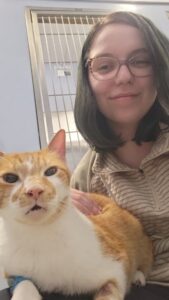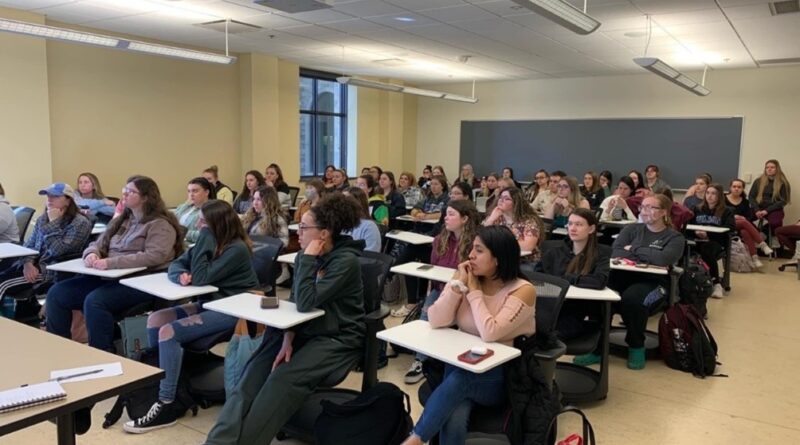Veterinary Students Not Required to Do a Thesis, Could Be at a Disadvantage
By Julia Johnson
Although most veterinary programs require thesis and non-thesis options, Wilson College only offers non-thesis based undergraduate degrees for their Veterinary Medical Technology students, now called Veterinary Nursing, leaving some students questioning if they are at a disadvantage when applying to vet schools for post-graduation.
Wilson College’s Veterinary Nursing program offers hands-on experience for students to become veterinary technologists, fulfilling all of the clinical requirements set by the American Veterinary Medical Association.
The program offers three different study concentrations within the field: veterinary biology, veterinary business management, and equi-assist. Veterinary biology prepares students for clinical work, seemingly “providing them with a foundation for students looking to enter veterinary school; however, additional course work is necessary to fulfill the prerequisites required for entrance”, according to the Wilson College Veterinary Nursing webpage.
The veterinary business management concentration gives students the tools to learn how to open their own practice in the future, as well as prepare them for more authoritative roles such as supervisor or hospital manager. The Equi-Assist concentration is the first of its kind in the nation and gives students the opportunity to learn about working with horses and mobile equine veterinarians specifically.
All three of the veterinary nursing concentrations are required to participate in an internship (VMT355) of their choosing at some point before graduation, as well as Veterinary Surgical Nursing (VMT415), where they perform spay and neuter surgeries on dogs and cats from Antietam Human Society, a local shelter.
Veterinary Nursing, and all three of its concentrations, is the only science-based program offered by Wilson College that does not require a thesis, or high-level research paper, to graduate.
Tammy Edge, a Wilson College alum and current Director of Veterinary Nursing, claims that vet schools aren’t as interested in thesis proposals as they used to be. “It’s not as high on the vet school applications anymore,” she said. “I know students who have gotten into vet school without it. If they’re really interested in pursuing veterinary research, they can do so at a research facility for their internship requirement. So, if they really think they need it, they can still get it without it being an actual course.”
Each veterinary nursing major is required to participate in 240 hours of internship work to fulfill their VMT355 course requirement. This can only be done after the majority of VMT courses have been completed. It is encouraged that students participate in an internship that fits the veterinary field they are looking to accept a position in after graduation.
Edge argues that the internship itself is more beneficial than any sort of research proposal, as it is tailored more to real-life experiences, and finds that veterinary schools are more likely to accept students with internship experience.
“The internship is very practical,” Edge said. “It’s more specific to their degree. The hands-on learning allows them to apply what they’ve been taught the past three and a half years. Physically doing it is going to be more beneficial than researching.”
One of Edge’s main arguments for not requiring a thesis course is VMT students’ lack of time.

According to senior and VMT student Sydney Park, the VMT415 Veterinary Surgical Nursing class takes up the majority of the students’ time, in and out of class.
“Time is definitely a constraint. Surgery takes up so much time,” she stated. “I don’t think I’ve had one day since our surgeries began where I haven’t been at the VEC outside of just class time.”
Park is not planning on applying to vet school post-graduating, but claims that if she were, she would want to have the experience doing a thesis, as it shows “dedicated interest to researching in the field, possibly discovering new things and improving veterinary medicine as a whole.”
Shannon Flaharty, another senior in the VMT program and Equi-Assist concentration, feels similarly, but sees both arguments.
“I do think if I was applying to vet school, I’d be at a disadvantage not having a thesis to propose. As a technician, I don’t think research is a part of your job. If you’re trying to go to vet school, then you should have a background in research.”
Flaharty learned a lot at her summer internship at Kopec Veterinary Associates and felt that her classes at Wilson had prepared her well for it, especially in areas such as lab work, vaccines, physicals, and radiology.
“I can see both sides of it,” she said, when asked if an internship was more beneficial than a thesis course. “The other side of it is, we have a lot on our plates as VMT students. We just wouldn’t have the time.”
Though there is a question of the disadvantages of not having a thesis course, it seems as though Wilson VMT students are on the road to success with veterinary-related internship experience alone.

